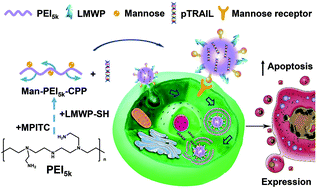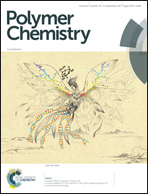A mannosylated PEI–CPP hybrid for TRAIL gene targeting delivery for colorectal cancer therapy†
Abstract
Polyethylenimine (PEI) is the most widely applied polymeric vector in gene delivery. However, its therapeutic application is hampered by the high cytotoxicity and poor in vivo transfection efficiency. We constructed a mannosylated, bioreducible hybrid of low-molecular-weight PEI and cell-penetrating peptide (termed Man-PEI5k–CPP) as a vector to deliver plasmid TRAIL (pTRAIL) for colorectal cancer treatment. We discovered that the colon cancer cells overexpressed mannose receptors (MR). With the combined functions of the tumor-targeting ligand and the CPP, the Man-PEI5k–CPP not only increased the cellular uptake efficiency, but also improved the efficiency of transfection, thus yielding enhanced inhibition efficacy on HCT116 human colon cancer cells, compared to the conventional PEI25k. The animal studies further confirmed the treatment success of Man-PEI5k–CPP/pTRAIL in the mice bearing xenografted HCT116 tumors and showed minimal systemic toxicity.



 Please wait while we load your content...
Please wait while we load your content...